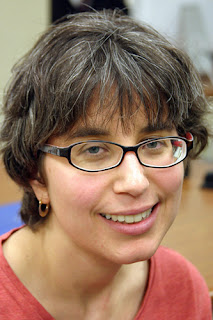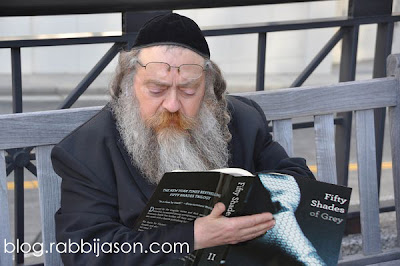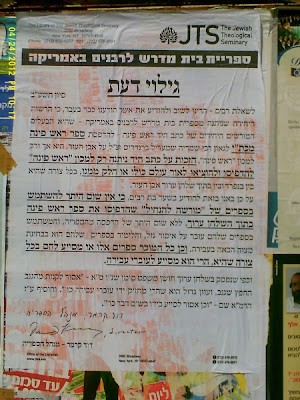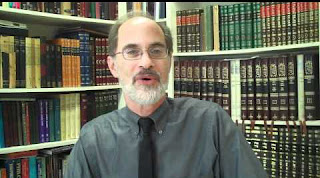Julie Wiener, a former Detroit Jewish News columnist who is now associate editor of The Jewish Week in New York, recently uncovered potential fraud relating to the E-rate program in ultra-Orthodox schools in New York. In a three-part exposé Wiener, together with special correspondent Hella Winston, explained how several ultra-Orthodox day schools and yeshivas in the New York area have been receiving millions of dollars of technology through the E-rate program, but never actually putting that technology to use in their schools because of their community’s disdain for the internet.
 |
| Julie Wiener, associate editor of The Jewish Week, discovered the potential fraud with the E-Rate program. |
Wiener’s four-month investigation revealed that of the almost 300 Jewish schools benefiting from E-rate, ten schools (all but one Chasidic) collectively were approved for nearly $9 million in E-rate-funded services in 2011, which amounted to almost one-third of the Jewish total. One yeshiva submitted requests in 2012 for 65 direct connections to the Internet including 40 computers, but no computer or Internet connection were ever installed. Wiener’s investigation also found a disparity in the amount of technology funding the New York area’s ultra-Orthodox schools were receiving. She writes, “While Jewish schools enrolled approximately 4 percent of the state’s K-12 students, they were awarded 22 percent of the state’s total E-rate allocations to schools and libraries.”
After reading the three-part series I had a chance to talk with Wiener about her investigative reporting and what she hopes will happen now that these schools’ alleged misuse of a federal technology fund has become publicized. “I’d like to see more investigation and oversight on the part of the FCC and the USAC [Universal Service Administrative Company, which oversees E-Rate], including more audits and actual visits to make sure the equipment that’s actually paid for is being used. I also want more people to know about E-rate. There are more schools that could benefit that haven’t even heard of the program.”
Wiener, who has been writing about Jewish education and technology over the past few years, says she first honed her investigative skills at the Detroit Jewish News in the mid-1990s. She answered some questions about the E-Rate story:
HOW DID YOU FIND OUT ABOUT E-RATE?
My colleague Hella Winston, who has done a lot of coverage of the ultra-Orthodox community, got a tip from someone several months ago and then found the E-rate Central site, where all the data is contained. The idea immediately appealed to us, because the Asifa – the May 2012 [Haredi] rally against the Internet – was still fresh in our memories, and also, I had been covering the whole issue of technology in Jewish education and yet had never before heard of E-rate. Initially, it felt overwhelming to go through the enormous amount of data, but fortunately I was taking a class at CUNY Journalism School this fall, which both inspired me to do data-driven articles and empowered me.
WHAT WAS THE PROCESS?
We decided early on to narrow our focus to New York State. That’s because this was already an enormous project, and because we are based in New York. We also knew that New York has the largest number of fervently Orthodox schools, and when we started we were unsure if the E-rate application process and rules vary from state to state. It turns out they don’t, but it still made our lives easier to focus on New York. I am hoping other journalists will follow our lead and look at E-rate use in other states with relatively large Jewish populations.
We spent a lot of time researching E-rate online, going through various audits and rulings, and congressional testimony about it. We also researched the schools and service providers online. To learn more about what goes on inside the schools, we spoke with the Jewish Education Project and various alumni of these schools. Hella has a whole network of people who have left or currently live in the community. We were reluctant to approach the schools, or even the E-rate consultants/USAC people until very late in the process, as we were worried someone might tip off the schools, making it difficult for us to obtain information, or even, if there was fraud happening, making a cover-up easier. Also, the program is so complicated and confusing that we wanted to make sure we understood it well before we interviewed anyone.
WHAT RESPONSE HAVE YOU GOTTEN SO FAR?
Overall the response has been very positive. Many of our readers are horrified that this is happening and concerned about this community – which doesn’t even use the Internet – getting tens of millions of dollars that other schools might make better use of. Assuming that at least some of this money is being misused – and it is hard for me to imagine it is not – this is hardly a victimless crime: USAC denied over $2 billion in requests last year, and for the past few years only the highest-poverty schools have been eligible for Priority 2 services – connections that make it possible to bring the internet into individual classrooms. Also, the money comes from a tax that we all pay into – the Universal Service Fund.
We’ve certainly gotten a number of angry comments from the ultra-Orthodox community – mostly along the lines of, “Why are you always picking on the ultra-Orthodox?” and “Why put this in the papers rather than just notifying the authorities?” There have been very few substantive critiques from the ultra-Orthodox as no one has explained why these schools need such costly tech services or how they are using things.
Yes, E-rate can be used for some non-Internet expenses, but the fact is that these schools are billing a lot of money for the Internet too and some have spent millions of dollars over the years. I find it interesting that none of these schools or service providers will talk to us, that there is no effort to show that they have the equipment they’ve billed E-rate for and how they are using it to benefit their students. Also, we live in a democracy, and the public has a right to know how tax dollars are being spent, particularly nowadays when government coffers are stretched so thin.
DO YOU THINK THERE IS FRAUD?
I have to be careful here, because I don’t want to be accused of slander or libel. However, I think that at the very least something inappropriate is happening. It makes no sense why schools that don’t give students access to the Internet – or even, in many cases computers – are disproportionately benefiting from this program, particularly when there are other schools whose needs are not being met. I am also puzzled as to why the USAC and the FCC have allowed this to go on for so long.
I should note that I doubt that, if there is fraud, the money is enriching individuals or going to fund luxuries – my guess is that it is sustaining the fervently Orthodox community which is financially struggling because individuals have very large families and don’t see public school as an option, most receive minimal secular education or career training, and many men study full-time, rather than work. While I sympathize with their need for money, it is not fair to ask the government to subsidize this lifestyle. If they invested in secular education or even considered enrolling in public schools, and if they encouraged people to pursue the training necessary for modern careers, they would be in a very different situation.
WHAT DO YOU HOPE WILL COME OF THIS ARTICLE?
I hope FCC and USAC investigate this matter and seriously audit these institutions – both the service providers and the schools. I also think it’s important for the public to be aware of the E-rate program – something that is little-known outside the circles of IT people at schools – and the Universal Service Fund, particularly at a time when all tax dollars are being increasingly scrutinized.
The Jewish Week’s three-part story on E-Rate and the Ultra-Orthodox schools in New York begins here.
Originally published in the Detroit Jewish News



